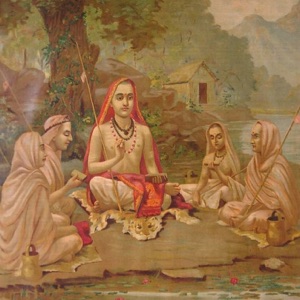From unreality lead me to the real, from darkness to the light, from death to immortality. Upanishads (circa 800 – 200 B.C.E.)


From unreality lead me to the real, from darkness to the light, from death to immortality. Upanishads (circa 800 – 200 B.C.E.)

Different is the Good and different is the dear, they both, having different aims, fetter you men; He, who chooses for himself the Good, comes to wellbeing, he, who chooses the dear, loses the goal. The Good and the dear approach the man, The wise man, pondering over both, distinguishes them; The wise one chooses the Good over the dear, […]

The sharp edge of a razor is difficult to pass over; thus the wise say the path to Salvation is hard. Upanishads (circa 800 – 200 B.C.E.)

He who has found the bliss of the Eternal has no fear from any quarter. Upanishads (circa 800 – 200 B.C.E.)

For in our searchings are found all our desires, and we gain victory over our worlds. Upanishads (circa 800 – 200 B.C.E.)

He who knows the Bliss of Brahman does not distress himself with the thought, “Why did I not do what is good? Why did I do what is evil?” Whoever knows this bliss regards both of these as Atman (self, soul), indeed he cherishes both as Atman. Upanishads (circa 800 – 200 B.C.E.)

That thou art. Upanishads (circa 800 – 200 B.C.E.)

Whoever sees all beings in the soul and the soul in all beings… What delusion or sorrow is there for one who sees unity? It has filled all. It is radiant, incorporeal, invulnerable… Wise, intelligent, encompassing, self-existent, It organizes objects throughout eternity. Upanishads (circa 800 – 200 B.C.E.)

Then he realized, I indeed, I am this creation, for I have poured it forth from myself. In that way he became this creation. Verily, he who knows this becomes in this creation a creator. Upanishads (circa 800 – 200 B.C.E.)

Of a certainty, the man who can see all creatures in himself, himself in all creatures, knows no sorrow. Upanishads (circa 800 – 200 B.C.E.)